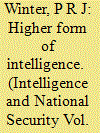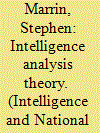|
|
|
Sort Order |
|
|
|
Items / Page
|
|
|
|
|
|
|
| Srl | Item |
| 1 |
ID:
080335


|
|
|
|
|
| Publication |
2007.
|
| Summary/Abstract |
Throughout his distinguished career, the historian Hugh Trevor-Roper was known in many incarnations and guises: the 'sleuth of Oxford'; Regius Professor of Modern History at Oxford; the Spectator's Mercurius Oxoniensis; Baron Dacre of Glanton; and Master of Peterhouse College. In addition, he was to gain wider notoriety in the early 1980s as the man who helped authenticate the forged Hitler Diaries. Nevertheless, his wartime embodiment as a British intelligence officer is one facet of his personal history that has never before been addressed by scholars in any great depth. Using previously unpublished material from Trevor-Roper's memoirs and personal papers, as well as excerpts from the Guy Liddell Diaries, this article aims to highlight the fact that, contrary to the impression engendered by F.H. Hinsley's dry and depersonalized multi-volume official history, British Intelligence in the Second World War, Major H.R. Trevor-Roper, and many other intelligence officers like him, not only had a 'good war', but a rich and colourful one. If historians are to escape the late Sir Maurice Oldfield's indictment of that official history, namely, that it was written 'by a committee, about committees, for a committee', they might do worse than begin to reappraise the role of the individual in the context of Britain's intelligence effort during 1939-45. The late Lord Dacre, so this article argues, is one such individual requiring further study.
|
|
|
|
|
|
|
|
|
|
|
|
|
|
|
|
| 2 |
ID:
080334


|
|
|
|
|
| Publication |
2007.
|
| Summary/Abstract |
Theoretical work involves explanation and prediction, but thus far there has been little scholarly work explaining and predicting the role of intelligence analysts in support of foreign and national security policies. Without a theory of intelligence, it becomes difficult to decide what the appropriate substantive analytical responsibilities of the intelligence community should be. Accordingly, a theory of foreign intelligence analysis is necessary. This paper presents a theoretical framework developed during the immediate post-Cold War timeframe to explain why there was such a wide variety of perspectives regarding the future need for intelligence, embeds these ideas within the existing intelligence theory literature, applies this framework more generally in a way that can be used to explain variations in the substantive coverage of intelligence analysis in the past and predict possible variations in the future, and then tests the theory's ability to explain the analytical focus of domestic intelligence organizations
|
|
|
|
|
|
|
|
|
|
|
|
|
|
|
|
| 3 |
ID:
080336


|
|
|
|
|
| Publication |
2007.
|
| Summary/Abstract |
Little is known of the history, structure and operations of the Italian intelligence services in the Mediterranean and the Middle East. The challenge brought by Fascist Italy to the security of the British and French imperial systems is at the heart of this article, which sets out to assess not only the imperial dimension of Fascist intelligence but also the response provided by Britain's and France's colonial authorities to Mussolini's ambitions in the Mediterranean and the Middle East. An examination of British and French intelligence archival material sheds new light upon perceptions of power and threat afforded by British and French policy-makers keen to maintain political control over their colonial and client states. The paper suggests that despite comprising a multitude of competing agencies, the Fascist services could rely on the work of motivated individuals and on the support of Italian diplomatic representatives overseas. Their ability to establish relations - although short-lived - with Arab nationalist leaders and their intense activities in British colonies, protectorates and mandates generated concern within the British Foreign and Colonial Offices. Meanwhile, poor intelligence coordination and assessment coupled with misguided assumptions about the nature of Arab nationalism hindered Britain's response to the challenge mounted by Mussolini's regime
|
|
|
|
|
|
|
|
|
|
|
|
|
|
|
|
| 4 |
ID:
080333


|
|
|
|
|
| Publication |
2007.
|
| Summary/Abstract |
During the Algerian war of independence (1954-62), Federal Germany became the theatre of a series of unexplained bombings and shootings that targeted Algerian nationalists and German arms dealers. At the time, these crimes were attributed to the Red Hand, a counter-terrorist organization or parallel secret service with a mission to defeat the enemies of l'Algérie française. This article argues that the attacks on West German territory were executed neither by vigilantes nor by renegade agents. Instead, they were carried out by the French foreign intelligence service SDECE with the full approval of the highest political authorities in Paris. Using the case of Federal Germany as an example, this article seeks to reveal how and why covert action - including state-sanctioned murder - became an integral and important part of the Algerian war, particularly of France's campaign to undermine the Algerian rebels' efforts to procure military and non-military supplies. The article will show that the Red Hand served merely as a cover to detract from the state's resort to such violent and criminal means
|
|
|
|
|
|
|
|
|
|
|
|
|
|
|
|
|
|
|
|
|